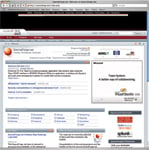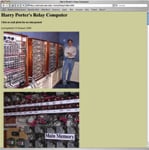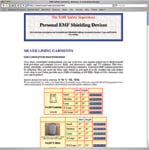1. Trying to keep track of what's happening in the fast-paced world of open source software development? If you are, hie on over to SourceForge, an open source software development site. SourceForge, which currently hosts more than 100,000 registered projects, acts as a centralized resource for managing these endeavors. (If you're interested in finding out more about TinyOS, for instance, you can look here to get the latest releases and revisions.)
 Melanie Martella |
 1. |
2. There are individuals out there with a Vision and time on their hands. Thanks to the Web, we can frequently view and enjoy their labors of love. One such project was pointed out to me by Ed Ramsden (Thanks, Ed!). Harry Porter, from the Dept. of Computer Science at Portland State University, has created a computer out of relays. It is large. It is frighteningly wiring-intensive. It is carefully labeled. It is also absolutely fascinating.
 2. |
www.cs.pdx.edu/~harry/Relay/index.html
3. Finally, replace your tin-foil beanie with a snazzy shielded baseball hat! The EMF Safety Store offers all kinds of EMF detection and protection equipment, including a variety of garments, bedding, and grounding devices to shield you from EM radiation.
 3. |
NEW TO BOOKSHELVES
Electrical Engineering 101: Everything You Should Have Learned in School but Probably Didn't
Author: Darren Ashby
Publisher: Newnes, an imprint of Elsevier
ISBN: 0-7506-7812-7
This softcover book is aimed at those of you who want a refresher course in electrical engineering or those of you who need to bone up on the subject but don't have the background in it.
It is divided into seven chapters and comes with a CD containing a circuit simulator, schematic capture and PCB layout tool, FilterPro for op amp filter design, and a PDF reference of all the rules of thumb listed in the text.
 |
Listing the titles of the chapters should give you a good feel for the breezy nature of the writing: Three things they should have taught in Engineering 101, Basic theory, Pieces parts, The real world (which includes a section titled When Parts Aren't Perfect), Tools, Troubleshooting, and Touchy-feely stuff. The touchy-feely stuff, in case you're interested, includes sections on people skills and snapshot descriptions of different types of managers and co-workers and how to deal successfully with them.